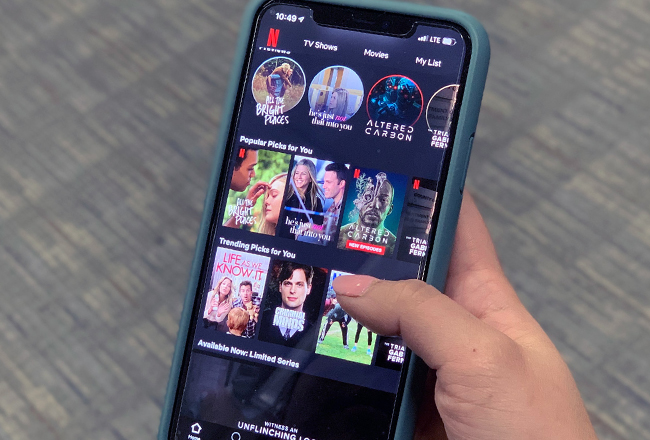Streaming services use content to win digital battle for viewers
Over the past few years, there has been an extraordinary increase in the number of streaming services vying for consumer attention and subscriptions.
The recent Fairfield University discussion “Streaming Wars: Competition for Your Subscription” detailed how the major streaming services will fight to obtain and maintain a dominant role in this fast-growing sector.
Bridget Williams, senior vice president of strategy and operations at Hearst Newspapers Digital Media, observed that engaging content is the prime challenge facing the streaming services.
 “You”™ll start to see that even if you are a subscriber to multiple services, 90% of those offerings are not relevant to you,” she said, adding the companies that will hold a leadership role in this realm will be those “who have a very clear idea of their audience and start developing content that serves that audience specifically. I think the broad categories is where there is going to be problems.”
“You”™ll start to see that even if you are a subscriber to multiple services, 90% of those offerings are not relevant to you,” she said, adding the companies that will hold a leadership role in this realm will be those “who have a very clear idea of their audience and start developing content that serves that audience specifically. I think the broad categories is where there is going to be problems.”
Adam Rugg, an assistant professor of communication at Fairfield University, noted the Disney media empire was relatively late in recognizing the potential of streaming, but has muscled its way into becoming a major player with popular content.
“Why are people subscribing to Disney Plus?” he asked. “It”™s because of the content. It”™s ”˜The Mandalorian,”™ it”™s Marvel, it”™s Pixar, it”™s ”˜I want that stuff.”™ ”
In comparison, Rugg continued, Netflix is going to face a struggle by having a surplus amount of content that cannot appeal to everyone.
“Do I still need Netflix?” he mused. “Am I spending 45 minutes on Netflix looking for something and then going, ”˜Eh”™? The companies that are going to ultimately win have that catalog and that stream of ongoing content that connects with people.”
Stephen Beck, a managing partner at New York City management consulting firm cg42 and a frequent guest commentator on CNBC”™s “Squawk Box,” predicted that Netflix will soon be facing a subscriber exodus.
“Their No. 1 show is ”˜Friends”™ and that goes bye-bye in a couple of months,” he said.
Beck forecasted a near-future where major media conglomerates will see streaming as “the final economic battlefield” and the central focus of their corporate operations, especially with Disney Plus.
“We see that in the future becoming the front-facing version of Disney, where everything sort of runs through that,” he stated. “We”™re seeing their movie franchises playing out through Disney Plus, with ”˜Star Wars”™-related shows and I believe a Marvel-related show. And you are not going to be able to get the full plot or story of the Marvel universe without seeing the shows.”
The exception to the rule, Beck pointed out, was Netflix, which he believed was vulnerable against major companies.
“Comcast, AT&T, Apple, Amazon, Disney are just massive compared to Netflix,” he said. “And if other telecommunications like Verizon get into this at some point, they”™ll see streaming platforms as the way to operate a media conglomerate. Do other large media companies get involved here? I wonder if there is a place for Netflix ”” can they stay independent and compete at the economic scale all these other companies operate at?”
Rugg noted that Netflix is placing a heavy emphasis on quality content, with significant funding of marketing related to entertainment industry awards.
“It”™s all about how good the stuff on the platform is, not how good the platform is,” he opined.
But while streaming services have taken away viewers and the monthly subscription fees from cable television providers, Williams complained there were still some areas where its content was lacking ”” particularly with news and live events. A self-identified “cord cutter,” Williams lamented over the difficulties she faced in trying to view the recent Democrat Party presidential candidate debate from Las Vegas.
Rugg did not believe that cable television will be able to compete as an equal against streaming.
“People don”™t like to look at dated technology,” he said. “Traditional cable thought they were the gateway to the things people wanted. And then a funny thing happened: the internet.”
Rugg warned that the streaming industry might be repeating cable television”™s mistake when it comes to subscription fees.
“There is only one wallet,” he said. “In three years, if you subscribe to Netflix, Apple TV, Peacock and HBO Max, you will be spending more than if you”™ve had cable.”
The solution, Rugg felt, was service bundling.
If there was a downside to streaming”™s ascent, Beck stated, it was the “breakdown of mass culture and shared experiences” ”” the diversity of viewing choices fragmented the audience rather than united viewers into appreciating a single broadcast. But Beck felt that obstacle will be overcome.
“Streaming is experimenting with live broadcasts and releasing content one episode per week,” he said. “A lot of excitement comes from shared experiences and a lot of meaning that”™s created. None of the streaming services are successfully capturing that.”